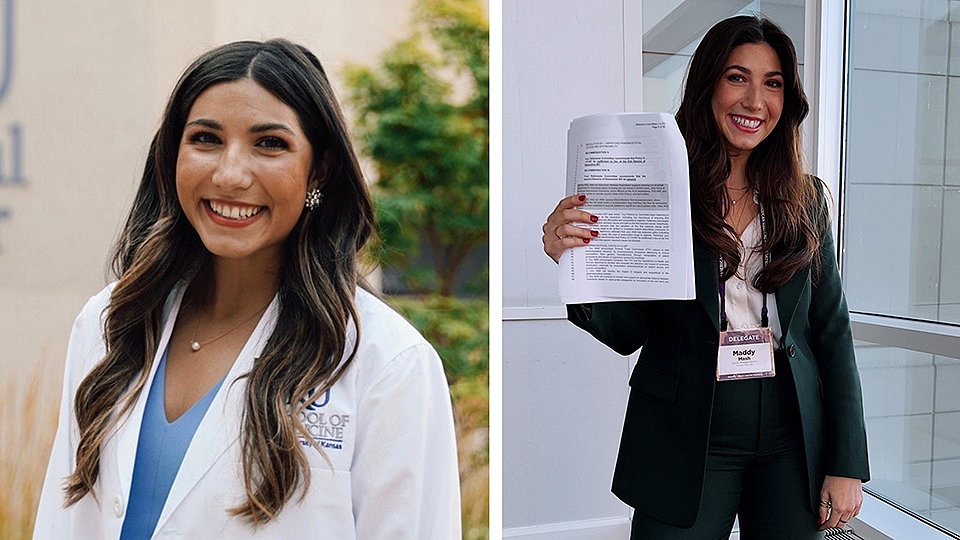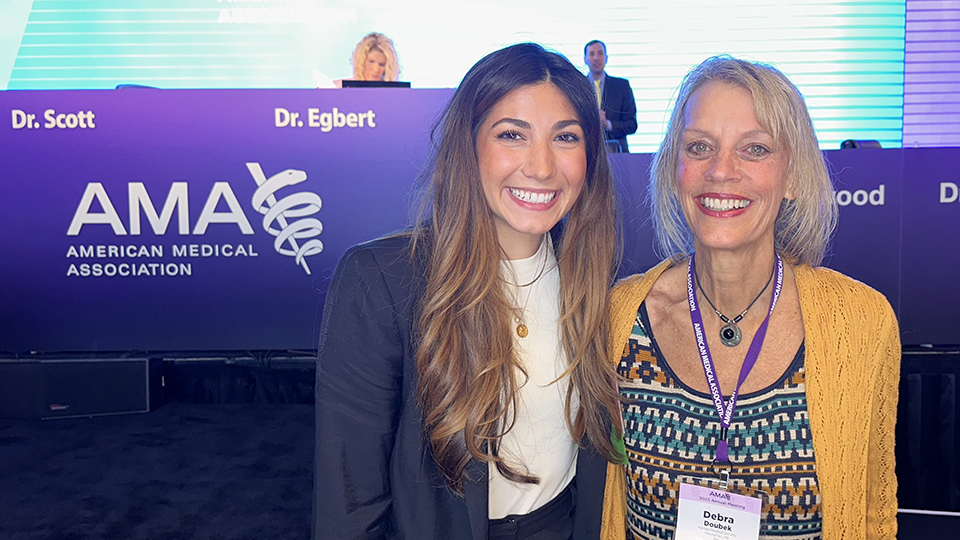K-Stater Maddy Mash ’20 combines advocacy with career in medicine to create change on a national level
Since she was little, former K-State Student Ambassador Maddy Mash ’20 dreamed about
a career in medicine. She was even present for her younger brother’s delivery, and
she recalls actually sitting on the OB/GYN’s lap.
“At that point, I said I was going to be a doctor,” recalls Mash, who went on to major
in microbiology at K-State and is a current medical school student at the University
of Kansas, pursuing general surgery.
However, there was one point during her senior year at K-State when she started questioning
her lifelong dream of working in medicine.
She loved the experience of serving as a Student Ambassador, and using skills like
public speaking, networking and advocacy. She wasn’t sure how these other passions
would align with a potential medical career.
Then thanks to conversations with a trusted mentor, she realized that these were actually
very useful skills to have as a physician.
“All these skills that I've learned are actually directly applicable to medicine,
and there's a million routes that you can go,” she said. “And so one of those routes
that I took was advocacy. It's important for patients to advocate for themselves,
but also for the physician to advocate for quality of life. Because it doesn't matter,
most of the time, to patients what's going on at the microcellular level, but it matters
how they live their day-to-day and how their symptoms impact them.”
Based on her own personal battle with Crohn's disease, she spent more than a year
working on a resolution for the American Medical Association. This resolution was recently passed by the House of Delegates (the legislative and
policy-making body of the AMA) as national policy for the organization. The passing
of official AMA policy clears the path for lobbyists in Washington, D.C., to advocate
for change on a federal level.
An advocate for access and affordability
Mash was diagnosed with Crohn’s disease at the age of 14. She said her parents immediately
started teaching her about insurance and being her own personal advocate so she could
take control of her health care, even as a teenager. She remembers learning how to
make her own doctor appointments and spending hours on the phone with insurance companies
advocating for better coverage.
Towards the beginning of medical school, she recalls having to deal with stresses
surrounding her need for an extremely expensive medication costing thousands of dollars.
Her insurance had a specific pharmaceutical plan that required her to pay that money
out of pocket and then she would get reimbursed for it later.
“This [medication] is giving me stability and quality of life. I need this, and so
it just felt very unfair,” she said of the large up-front cost.
Over the next couple of years, she started to dig into issues that other people with
the same insurance plan might be experiencing. She wanted to know if the requirement
to pay for a medication up front was serving as a barrier to access.
She became involved with AMA as a medical student and served as a regional delegate,
and then decided to write her own policy.
“I did a ton of research on what is the patient burden when it comes to costs for
patients who have this type of insurance plan, which is a direct member reimbursement
plan. And what we found is, even if a patient doesn't have a super expensive medication,
but they have five medications that they're on, they still have to put up $300 a month
out of pocket, and then wait for that reimbursement and it's just not very sustainable.
I think it's a type of plan that has just become a little bit antiquated with the
way that pharmaceuticals have gone. Things have gotten so expensive on that end. It’s
just hard for them to afford very life-saving, quality of life preserving medications.”
She wrote a resolution asking the AMA to oppose these types of insurance plans and
testified about her research. A number of medical societies, including the American
Society of Clinical Oncology, also voiced their support, and the resolution passed.
“It means that it's official AMA policy,” Mash explained. “So now, it's part of what
they advocate for on a national level. They can now send liaisons to Washington, D.C.,
to actually fight in the House for actionable change.”
While this change may not happen immediately, Mash believes the AMA’s actions will
bring hope to patients struggling with chronic illness.
“I think it's hopefully a step in the right direction for access and affordability
of these life-saving medications,” she says.
‘A life education’
Even though Mash is no longer a student at K-State, her experiences as a Wildcat continue
to shape her as a medical practitioner and a patient advocate.
In high school, she said she decided to pursue her undergraduate degree at K-State
because she felt like she would be supported as a student.
“I would get a life education and not just learn the class. You can take classes anywhere,
right? A lot of people questioned why I didn't go to KU if I wanted to go to med school.
And I have never regretted that for a single day in my life. I'm so thankful that
I went to K-State. I love that K-State is such a friendly place, and that people genuinely
care about each other, you care about your peers.
“At K-State I felt very supported to develop really any skill that I wanted to and
become a really well-rounded individual. And specifically, with Student Ambassador,
I really got to strengthen my interpersonal communication skills and work on strategic
communication, how to connect with people from different backgrounds. And I think
it's given me a really good pulse on how Kansas is as a state and the different cultures
that we have in different areas of the state. I think it's important to know your
patient population.”


